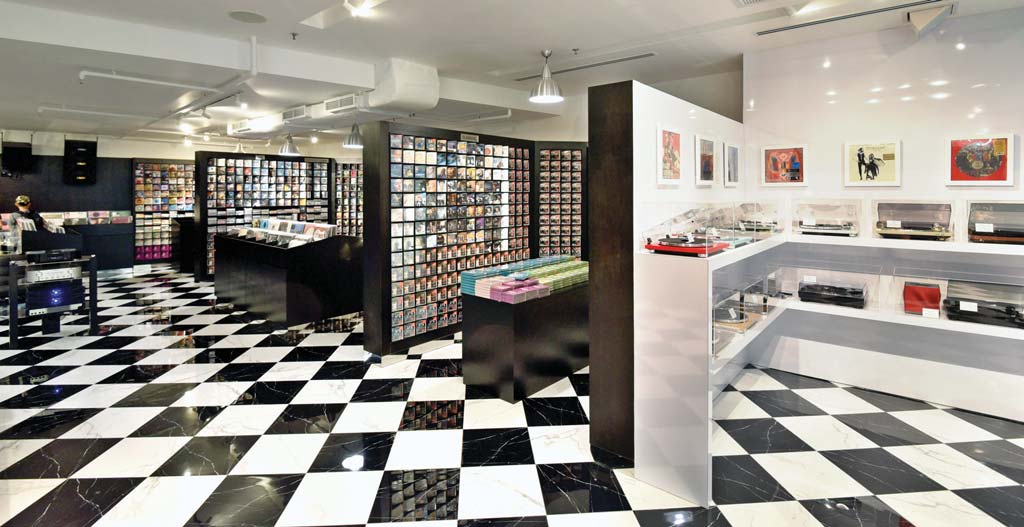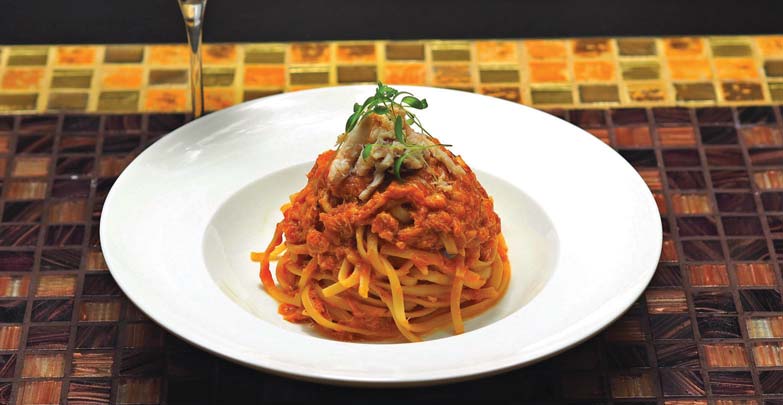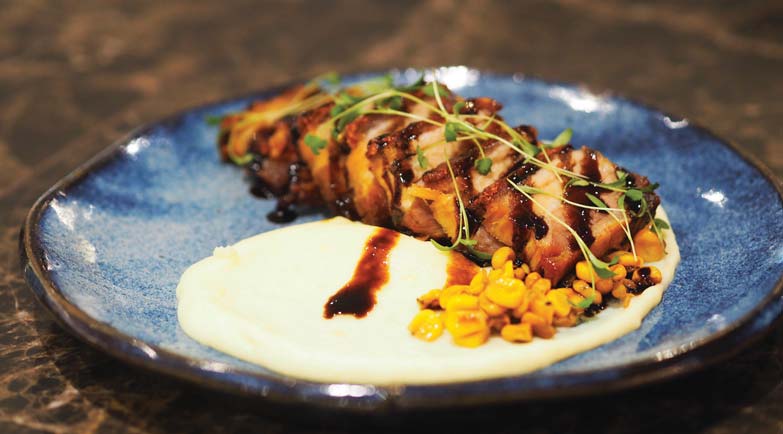 Turntables are the first things customers encounter as they enter That CD Shop
Turntables are the first things customers encounter as they enter That CD Shop
 Wonderland's linguini chilli crab
Wonderland's linguini chilli crab
 Pork belly confit
Knack for selling music
Pork belly confit
Knack for selling musicAmbience-wise, Wonderland certainly plays up the whimsical, with arresting artwork of The Queen of Hearts, the Mad Hatter and the White Rabbit taking centrestage. But above all, it bears the stamp of owner and CEO Lee, who infused his CD shops with his own brand of polish. That aesthetic, which melds old-world glamour with daring, has extended to the eye-catching covers of his High Society CDs and later to his first all-day dining café, High Society at Marina Bay Sands. Wonderland gleams with mosaic tiles, teardrop chandeliers and plush armchairs that Lee picked out. The menu is a collaboration between the tattooed head chef and Lee, a music store owner who reinvented himself into a restaurateur by watching cooking videos on YouTube. “Herry drives the whole business. He is the brains, the creative guy, the numbers guy,” says Tan-Wijaya, who teamed up with Lee when he approached her to be a partner in The Mansion, a lounge-club at Pacific Plaza about five years ago. The Mansion has since been sold for an “offer we could not refuse”.
However, downloadable music was catching on and with cheaper and faster online access, the internet became the preferred way to listen to music. Paid subscriptions are now the top-selling music format, double in dollar value compared with CD sales in the US market. Last year in Singapore, digital music sales, on platforms such as Spotify and Apple Music, totalled $15.8 million — just under three quarters of total music sales. Although interest in vinyl is returning, it remains a sliver of the overall music market. For good reason: It is expensive. Adele’s album 25, for example, sells for $69.90 at That CD Shop, while a throwback such as Michael Jackson’s Thriller will cost $49.90. In contrast, Spotify Premium costs a much more palatable US$9.99 a month. And while CDs are also making a comeback, it is clear streaming will strengthen its stranglehold on the market. Analysis by PwC predicts that streaming will account for about 90% of total recorded music revenue in Singapore by 2022. The marketplace has been changed forever. Lee knows that only too well, having had to close his stores one by one. His creative outlet turned from music to food and with that came his first music-themed café High Society, which has thrived on the high tourist flow and convention business at Marina Bay Sands. Wonderland, which is on Orchard Road, is designed to cater more for locals and long-time customers. Lee and Tan-Wijaya are aware that the dynamics of shopping — across the board, and not just in music — have been upended by the internet. “You can pretty much buy anything online now,” says Tan-Wijaya. As a broker between landlords and tenants in the retail and lifestyle segment, she has her finger on the pulse of the shopping and entertainment scene. “You have to give people a reason to come to the store — an experience that they can’t buy online. Something sensory that they can touch and feel,” she says. A music–themed restaurant with the music store as the heartbeat of the restaurant is the very kind of experience shoppers look for in a mall, she reckons. F&B is indeed the one bright spot in a battered retail environment. Reflecting how offline spending patterns have shifted from retail to lifestyle, the group now gets two-thirds of its revenue from F&B. Yet for all that, Lee has not given up on the music business. These days, aside from overseeing the day-to-day operations at both restaurants, he spends much of his time sourcing and procuring vinyls. He is hoping that, in a time of instant gratification, more people will discover the joy of taking the time to sit down and listen to records. He is also hoping to bring back good old-fashioned shopping. “Twenty-five years ago, a trip to the music store was a family outing. You would follow your dad and browse through the records,” says camera-shy Lee, who declined to be photographed for this interview. “We no longer have that after the internet. Everyone is on their iPad or phone, wrapped up in their own world. With our store, we often see families browsing through records together and I want to bring more of that back.”
Sunita Sue Leng, formerly an associate editor at The Edge Singapore, fondly remembers the days of vinyls and cassettes. This article appeared in Issue 844 (Aug 20) of The Edge Singapore. Subscribe to The Edge now











